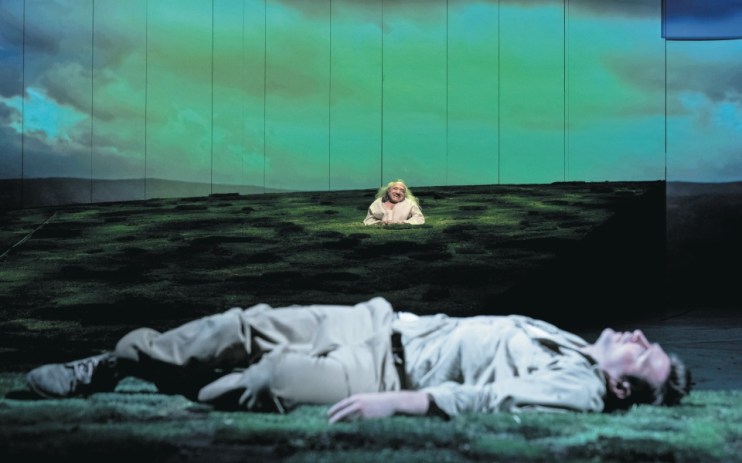Peter Gynt at the Olivier is a toe-curling, overlong adaptation of Ibsen’s mad epic

Before the curtain rose for this reimagining of Ibsen’s allegorical play Peer Gynt, audience members were surreptitiously snapping pictures of the set, presumably to impress their Instagram followers. “I’m at the theatre! #culture”.
How appropriate for a play (originally a poem but adapted soon after) that asks if a life can be fulfilled simply by winning the adulation of others, or whether you have to actually, you know, do something.
This modern reinvention by David Hare – now on his 18th play for the National Theatre – follows Peter Gynt, a boorish dreamer from Dunoon whose heroic war stories are all lifted from Dam Busters. He’s a fantasist, a liar and a rogue, uninterested in doing anything worthwhile, but desperate for everyone to think he is.
After running off with a disaffected bride on the day of her wedding, he’s hounded from his hometown and sets off to carve out a name for himself, meeting the king of the trolls, rising to the top of the business world, and posing as a prophet.
Adapting a work so sprawling – in both scope and length – is no mean feat. Surely Hare, though, the doyen of middle-brow theatre, is the man to pull it off? Alas not. His play slogs an ungainly path, attempting to capture the chaotic energy of the original text, but hamstrung by the need to constantly reference it.
In the end, the modern jokes – and I use the word charitably – feel conspicuous, and the Norwegian parts sit awkwardly.
A trio of country women are recast as hotpant-clad cowgirls who erupt into the first of the evening’s ill-conceived songs. The trolls become a Bullingdon Club-esque bunch of pig-nosed toffs; Gynt’s success sees him morph into the permatanned owner of a Florida golf course (complete with long red tie, should you miss the well-signposted reference).
This bluntness becomes weaponised over the course of more than three hours, beating you into submission with gags that feel like they were workshopped years ago. There are skits on Bitcoin and blue passports, Netflix and Nandos – it’s like watching reruns of Mock the Week on Dave.
The best scenes – all in the final act – are the quieter ones that err closest to Ibsen: Peter mourning the passing of his mother, or bargaining with death’s emissary upon realising the hollowness of his sham life are genuinely moving.
But these moments don’t come close to excusing the preceding two-and-a-bit hours, which are as tiresome a theatrical experience as I can remember.
How appropriate for a play (originally a poem but adapted soon after) that asks if a life can be fulfilled simply by gaining the adulation of others, or whether you have to, you know, actually do something.
This modern reinvention by David Hare – now on his 18th play for the National Theatre – follows Peter Gynt, a boorish dreamer from Dunoon whose heroic war stories are all lifted from Dam Busters. He’s a fantasist, a liar and a rogue, not interested in doing anything worthwhile, but desperate for everyone to think he is.
After running off with a disaffected bride on the day of her wedding, he’s hounded from his hometown and sets off to carve out a name for himself, meeting the king of the trolls, rising to the top of the business world, and posing as a prophet.
Adapting a work so sprawling – in both scope and length – is no mean feat. Surely Hare, though, the doyen of middle-brow theatre, is the man to pull it off? Alas not. His play slogs an ungainly path, attempting to capture the chaotic energy of the original text, but hamstrung by the need to constantly reference it.
In the end, the modern jokes – and I use the word charitably – feel conspicuous and awkward, and the obviously Norwegian parts are just plain weird.
A trio of country women are recast as hotpant-clad cowgirls, who erupt into the first of the evening’s ill-conceived songs. The trolls become a Bullingdon Club-esque bunch of pig-nosed toffs; Gynt’s success sees him morph into the permatanned owner of a Florida golf course (complete with long red tie, should you miss the well-signposted joke).
This bluntness becomes weaponised over the course of more than three hours, beating you into submission with jokes that feel like they were workshopped years ago. There are skits on Bitcoin and blue passports, Netflix and Nandos – it’s like watching reruns of Mock the Week on Dave.
The best scenes – all in the final act – are the quieter ones that err closest to Ibsen’s original: Peter mourning the passing of his mother, or bargaining with death’s emissary upon realising the hollowness of his sham life.
But these highlights don’t come close to excusing the preceding two-and-a-bit hours, which are as tiresome a theatrical experience as I can remember. Playwrights take note: this is a textbook lesson in how not to update a classic.
